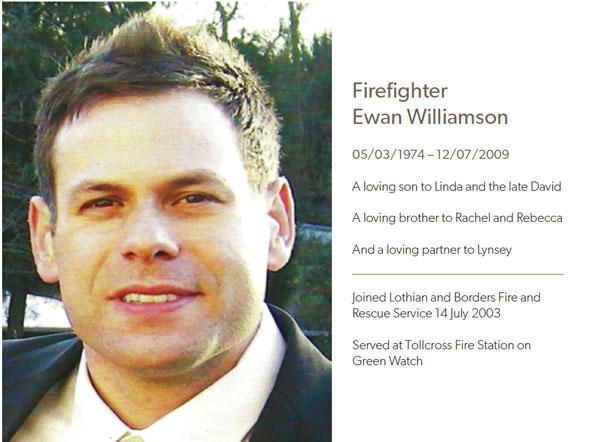

The Scottish (UK) Fire and Rescue Service (SFRS) recently released a line-of-duty death report that detailed findings from an investigation into the 2009 Balmoral Bar Incident in Edinburgh, which claimed the life of Firefighter Ewan Williamson.
From the Chief Officer’s forward to the report:
“On 12 July 2009 at 00.38hrs Lothian and Borders Fire and Rescue Service received a call to a fire in a public bar at 178 Dalry Road, Edinburgh. The original seat of the fire was within the basement, in a room used as an office, with fire and smoke spreading upwards towards the flatted properties above.
The initial firefighting tactical plan prioritised the rescue of residents from those flats and locating and extinguishing of the fire. During the firefighting operations firefighter Ewan Williamson, while attempting to exit the ground floor, entered a room off the public bar area and became trapped due to the door becoming jammed.
While trapped in the room Ewan was instructed to activate his distress signal unit and a breathing apparatus emergency was declared by the sector commander. The attending firefighting crews made strenuous efforts to affect his rescue, at times placing their own lives at risk in an attempt to rescue Ewan. Tragically they were unable to reach him in sufficient time to save his life.”
Among the lessons learned cited in the report:
- The incident has highlighted the urgency for the SFRS to implement a robust breathing apparatus policy and procedure.
- Training operational staff in the developed SFRS breathing apparatus procedure, and ensuring they are competent, will reduce the risk to firefighters.
- Early consideration needs to be given to the development of a SFRS policy for the tactical ventilation of buildings.
- The training of operational staff in tactical ventilation techniques to ensure competency in line with SFRS policy will reduce the risk to our firefighters.
- There is a need to renew the emphasis on the resourcing of an appropriate command, control and communications infrastructure at complex incidents.
- The level of training for operational staff in risk management is insufficient to ensure a balanced approach between meeting operational needs and the health and safety of staff on the incident ground.
- Any future enquiries are required to ensure that the timely effective and proportionate organisational support to staff in such stressful situations is made available.
- The resources required to provide expert advice to a police force outside Scotland in support of an investigation on this scale should not be underestimated.
- The full set of professional competencies required to undertake an investigation of this nature is unlikely to be available within any fire and rescue service.
The report also listed a number of recommendations for the SFRS to adopt:
1. The SFRS to develop an overarching BA policy that includes detail on the requirements for BA training and welfare arrangements.
2. SFRS to develop and publish a standard operating procedure (SOP) on the use of breathing apparatus.
3. SFRS to develop, publish and implement a training standards framework that includes the use of breathing apparatus.
4. The SFRS to develop and implement a consistent policy and procedure for tactical ventilation across the Service.
5. All operational staff from firefighter to watch manager require to be competent in line with the SFRS tactical ventilation policy and procedure.
6. All flexi duty managers are required to have an understanding of the application of tactical ventilation techniques so that they are competent to develop a tactical ventilation plan.
7. In addition to an ongoing maintenance of skills programme, refresher training is required in line with the SFRS training standards framework.
8. An operational maintenance of skills syllabus and training programme is developed to ensure competence in incident command and functional roles is confirmed and maintained.
9. The SFRS to develop incident command and functional officer memory aid to provide support to those undertaking functional roles.
10. The SFRS operational assurance process is required to support the ongoing development of incident commanders by sharing lessons identified.
11. The SFRS to ensure that the communications infrastructure on the incident ground is fit for purpose.
12. The SFRS is required to develop a risk management policy and guidance for use at operational incidents. This is required to provide clarity on the SFRS operational risk appetite.
13. A greater focus is required to embed ARA into decision making when developing an operational or tactical plan. Therefore it should become a key component of incident
command training.
14. Operational personnel at all levels require training on risk management to improve the use of DRA and ARA in order to improve firefighter safety.
15. Consideration should be given to supporting the undertaking of a UK wide project into behavioural safety at operational incidents.
16. The SFRS is required to test their capability and capacity to deal with the occupational health requirements for an incident on the scale of the reasonable worst case scenario (challenging, yet plausible manifestation of the risk).
17. The SFRS should review their Death in Service Policy taking due consideration of the Chief Fire Officers Association Death in the Workplace guidance.
18. Clarity on the role, responsibilities and financial arrangements prior to the drawing up of a protocol between the SFRS and a police force requires to be established.
19. The SFRS should develop a database of professional advisors to support complex investigations and project delivery in areas that are outwith the scope of internal staff competencies.
Download the complete report HERE (PDF, 2.9 MB).


